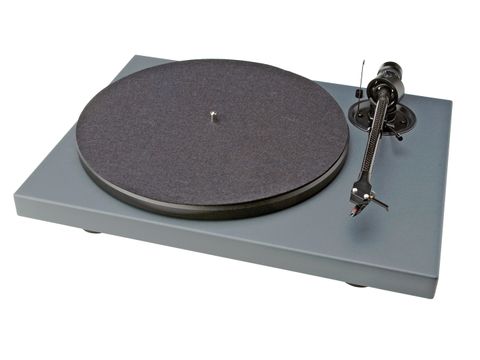TechRadar Verdict
Pro-Ject has made a good job of upgrading the Xpression. Anyone looking for a smooth and engaging turntable with the ability to revel in the glory of vinyl would be a fool not to put it on their shortlist.
Pros
- +
Broad range of set up features, involving agile sound with good detail resolve, easy upgrade of stylus and arm cable. Carbon fibre tonearm.
Cons
- -
Bass is a little limited in extension and solidity, crude downforce setting, well hidden on/off switch. Feet offer limited isolation.
Why you can trust TechRadar
Pro-Ject, the Czech Republic's foremost turntable maker, has been busy upgrading its Xpression deck, a model that has been around for three years. The MkII Xpression is still a solid plinth design with a cast alloy platter, AC motor and carbon fibre tonearm, but it differs from its predecessor in a few key areas.
The carbon arm, was radical at the price, but it never looked that substantial. But now, it finds itself in a thicker form with better bearings.
Like upmarket Pro-Jects, the arm cable terminates in phono sockets like any other source, meaning you can easily upgrade this important link for better performance.
The new pick-up arm (8.6c) is built from conical section carbon fibre with a glued-on aluminium headshell, running on gimble bearings with sapphire beds. It is fully adjustable in height and can even have its tube rotated in order to align azimuth (the uprightness of the cantilever from the front).
The turntable's base is much improved; combining metal cones with a Sorbothane alternative, it offers better isolation than the rubber feet of yore. As this 'suspension' is all the turntable has to offer, this could have a significant effect on the end result.
There is also an increase in platter mass, up by 15 per cent, which should produce a small and hopefully worthwhile, increase in inertia. Unlike many turntables, this is a fully functioning deck, complete with an Ortofon OM10 moving magnet cartridge and a rubber decoupled 'quiet running' motor, that uses a flat belt to drive the alloy platter.
Once you have set up the downforce using the crude calibration on the counterweight, fiddled with the anti-skate dongle, and located the on/off switch under the plinth, you are ready to go.
The dedicated will want to check the factory-set cartridge alignment; our sample only required a minor tweak to bring it to anal-retentive installation levels.
Appealing sound
Its sound reveals much of what makes vinyl such an appealing medium. It is open, energetic and spacious, with plenty of detail and a good helping of tonal colour. Unlike some budget decks, it is also highly stable and tracks well, even if it is placed closer to the speakers than we would like.
There is no hum if you remember to connect the earth cable to both turntable and phono stage. In fact, it's quiet enough to reveal hum in the run-in groove (presumably coming from the cutting lathe).
The supplied Ortofon OM10 Super cartridge (£40), is limited when it comes to bandwidth extremes; a heavy track from Massive Attack successfully provoked OTT upper bass, but we didn't hear the depth and weight that better needles have dug out of this particular groove. But, Ortofon makes three higher quality styli that can be swapped for the standard 10, should you want to upgrade.
Put on a truly classy recording and it revels in the luxury of sound on offer and gets right into the groove. It may be time for the competition to go back to the drawing board.
Tech.co.uk was the former name of TechRadar.com. Its staff were at the forefront of the digital publishing revolution, and spearheaded the move to bring consumer technology journalism to its natural home – online. Many of the current TechRadar staff started life a Tech.co.uk staff writer, covering everything from the emerging smartphone market to the evolving market of personal computers. Think of it as the building blocks of the TechRadar you love today.

